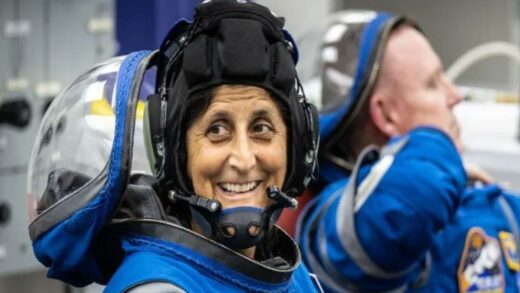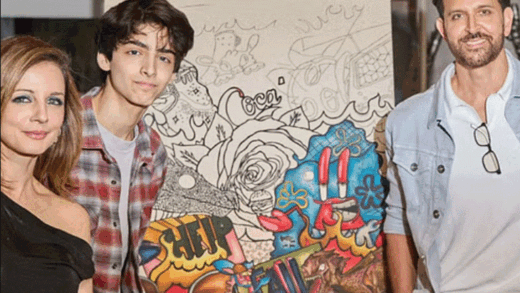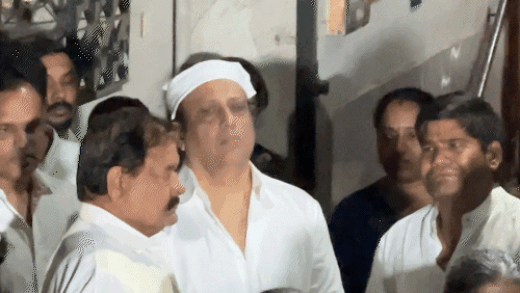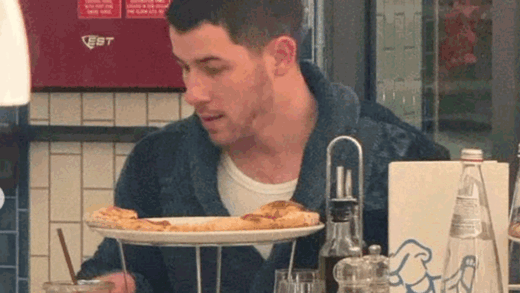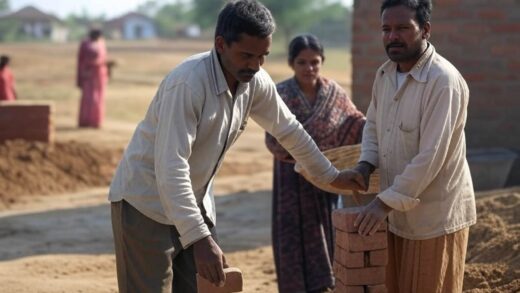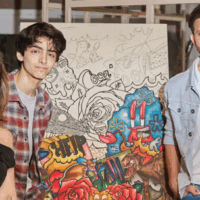Ncuti Gatwa is my new best friend, though I suspect anyone who has sat down with the actor has come away thinking the same thing. When we chat, we’re in different time zones: Gatwa is starting out his day in New York City, while I’ve just indulged in my usual 3 pm caffeine hit at home near Edinburgh. Gatwa is running a little late for our meeting, and when he dials in, I can tell his morning has been a rush. “I’m so sorry I kept you waiting,” he says as he takes a drink of water and settles himself. He’s wearing a white t-shirt with the sleeves turned up just so, gold chain necklaces and equally chunky rings. He’s inherently cool to the point where it could almost be intimidating, but after a few moments, and upon the realization that he’s talking to fellow Scot, he flashes a smile, and I know we’re in for a fun conversation. “Are those the Bottega Veneta earrings?” he asks me as he peers closer into his laptop screen. “They’re not real Bottega,” I confide, “but they’re giving”. There it is again: that movie-star smile coupled with a laugh so infectious that it takes us a minute to get back on track.
Gatwa doesn’t just look like a movie star; he is a movie star, having recently graced the screen with his depiction of Ken in Barbie and featuring in the big-screen adaptation of the beloved Jojo Moyes novel, The Last Letter From Your Lover. I don’t need a time machine to see that many more film roles await in Gatwa’s future; it’s as good as guaranteed. If his turn as Eric Effiong in Netflix’s acclaimed series Sex Education wasn’t enough to set him firmly on the path of fame and stardom, his latest role will undoubtedly seal the deal.
As I begin writing this, it’s two years to the day since it was announced that Gatwa would succeed Jodie Whittaker as the lead in Doctor Who. A coincidence? After speaking with Gatwa, I’d be more inclined to call it fate. For anyone who hasn’t switched on the BBC in the last 60 years, Doctor Who is nothing short of a British television institution: a sci-fi series that chronicles the adventures, escapades and witty back-and-forth of its central character, the Doctor. The show continues to reinvent itself each time a new Doctor is ushered in: Gatwa serves as the 14th and, notably, will be the first Black actor to play the iconic part. When I ask Gatwa how the role came about and what the process was like landing it, like the setting of much of the show itself, it seems to have been written in the stars.
(Image credit: Getty Images)
“You know, the interesting thing is it wasn’t arduous at all,” recalls Gatwa. “I had one audition, but really, it happened over the course of about a month and a half. It started with me texting my agent to say I would love to play Willy Wonka or Doctor Who, and then her responding saying she would speak to the casting director [about me]. There was a call with the casting director, and then a week later, going in for the audition. Then, the next week, I got the role. It happened so smoothly it caught me: I was like, ‘Surely it shouldn’t have been this smooth?’. I mean, I text her [Gatwa’s agent] last month saying, ‘Can I be Doctor Who?’ and then I was. It was wild! It all felt a little too good to be true. It still does, actually.”
Confident as Gatwa is—he practically radiates charisma—there’s an endearing humility about him, too. For the Rwanda-born, Scotland-raised actor, I imagine that the past few years have felt just that: Almost too good to be true. A natural performer, Gatwa’s penchant for drama and dance was apparent from a young age. And yet, he always planned on attending university. However, with some assurance from a teacher, Gatwa decided to pursue something more creative. Instead, he attended the Royal Conservatoire of Scotland followed by a stint at the Dundee Repertory Theatre, after which he found himself playing Mercutio in a production of Romeo & Juliet at Manchester’s Home Theatre. The stage might have been where Gatwa cut his teeth, but it was the aforementioned role of Eric in Sex Education that catapulted him into the spotlight, earning him millions of followers on social media in the process. Now, stepping into the shoes of one of the most iconic characters in British film and television history, I can’t help but wonder how the pressures of taking on a role loaded with heritage differ from one with a clean slate upon which you can fill in the blanks.
“Oh, I felt the pressure,” he laughs. “Pressure and expectations and engaging with 60 years of legacy. It felt huge; it was a very macro concept to get my head around. Getting cast in Doctor Who isn’t like getting cast as a character you get to create or one that doesn’t have that depth of heritage that Doctor Who has. It’s a show that people love and love to watch with others. People have watched it with their family members and have had it passed down onto them from their grandparents. So it felt like a new layer of responsibility than what I was previously used to. It’s something I felt like I was being tasked with looking after.”
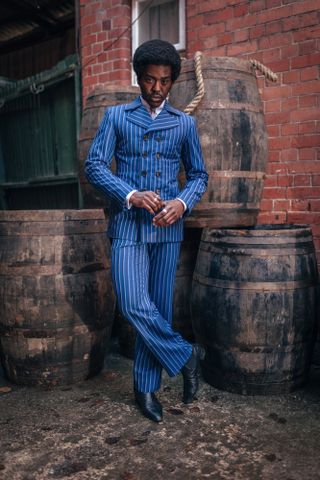
(Image credit: James Pardon/Bad Wolf/BBC Studios)
He’s right; Doctor Who is a show that brings so many people together—families, friends, generations. “It’s definitely a cultural thing,” continues Gatwa. “You’re effectively being handed over a piece of the cultural zeitgeist. In Doctor Who you know that you’re passing that [role] on to someone else and that it will be passed on to you from someone else. And so you’ve got to go, “Yeah, I need to make sure I don’t drop that baton.”
Gatwa is proud to be in this position, to be the new custodian of the Doctor, but his passion runs deeper. I get the impression this is a big deal not only to him but to his family, too. “Were they Whovians before you got the role? What was it like when you told them?” I ask. There’s that laugh again and then some internal reflection. He goes quiet for a second. “Their reaction was the best experience of telling my family that I had gotten a role in something—like they were waxing lyrical. And my brother, he couldn’t fucking believe it! He said, ‘Oh my god, you’re the next Doctor Who!’. They were over, so over, the moon. Because it’s everything we’ve discussed, everything we dreamed of. It’s a cultural institution. Because of that, I had been sworn to secrecy, but I couldn’t help it; I had to tell my family. I was straight on the phone. Mum!”
The way he talks about his family, it’s clear that they’re very close. We joke about how his achievements are his family’s achievements by proxy. He laughs, “Oh, yes, I know that my dad—my parents—are taking this as their own [achievement]. No one can ground you like your parents. But seriously, they’re very supportive, and I think it means the world to them that I get to play this role. I’m just really grateful.”
As we continue our chat, I begin to wonder if there’s anything Gatwa isn’t ready for, and that there’s less luck involved than he might have me believe. It’s clear he works hard, and that’s definitely put to the test with what I’ve seen of him in the first few episodes of the brand-new season of Doctor Who. When I ask him if he learned anything about himself in the process of becoming the Doctor, he chortles. “Yes! I don’t like mornings!” Then, a pause. He’s more serious now. Clearly Gatwa is a thinker.
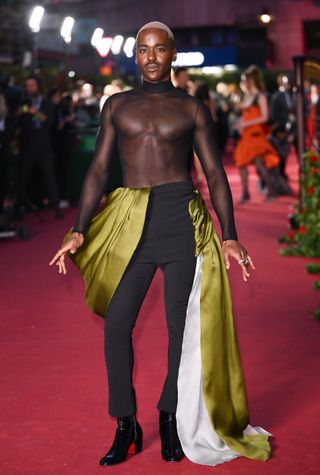
(Image credit: Getty Images)
“That’s a great question but also a difficult one. This is a show in which you are narratively in a completely new place—you will be on different planets, time periods, and solar systems each week. And so, each week, you’re being presented with a very different set of challenges, whether in the form of stunts, hanging from wires or being in a zero gravity chamber and filming upside down. Every day was a new challenge, and I had to keep telling myself I could rise to the occasion. I wouldn’t consider myself a singer at all, but I had to sing. That was a scene where I was like, ‘Right, Millie [Millie Gibson, who plays the Doctor’s companion, Ruby Sunday, in the new series], let’s do this!’. I’m constantly learning about myself on this job, learning that I can do more than I thought I could. And it’s been the biggest joy to have that opportunity. Millie and I joke that this show has given us a CV for any job we could want to do, ever. If you want to go to Star Wars, you can do that. Drama, you can do that. We’ve got the most perfect showreel either of us could ask for.”
I don’t think Gatwa needs to worry about future castings, especially when you consider the countless past colleagues who have attested to his solid work ethic, energy, charm and adaptability, with the latter proving especially useful in the wardrobe department. Speaking with Radio Times, Sex Education‘s costume designer, Daniella Pearman, proclaimed Gatwa “the best person to dress”. And the people behind Doctor Who are certainly making the most of having him on set. A few minutes into the first episode, we see Gatwa as the Doctor in a nightclub wearing a canary yellow vest top, tartan kilt and combat boots, thus setting the tone for a very different Doctor Who aesthetic.
Each Doctor has had a look they’ve become synonymous with—from Tom Baker’s striped scarf to Matt Smith’s bow tie, with David Tennant’s blue tailored suit thrown in along the way. Gatwa’s Doctor, however, has much more swag. And it’s intentional.
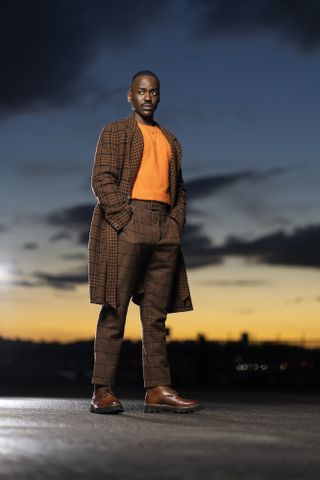
(Image credit: James Pardon/Bad Wolf/BBC Studios)
“I remember when I initially went in for the honing of the scripts; it was the first time seeing the producers after getting cast, and I knew that I was going to be asked for my ideas on the look and what his look should be, and I’d been scouring and scouring for weeks. I had come across and loved Ralph Lauren’s capsule for Morehouse College and other HBCUs [Historically Black Colleges and Universities], and I thought, ‘God, that’s perfect for my Doctor’. It combines heritage, really sick, clean-cut tailoring and that whole world of Ralph Lauren, but also this whole unmistakable aesthetic of Blackness. They [the producers] loved it but for one thing. They said, ‘Why limit yourself? The Doctor has traveled all of space and time and should have a really epic wardrobe’. They were really open with me playing with different textures, fabrics, gender: They wanted me to be free to be in skirts one week and something different the next. They said, ‘We can’t have you in this show and not play around with fashion’.”
To hear anything otherwise would have been a red flag. You need only Google the words “Ncuti Gatwa” before thousands of photographs of him in downright incredible outfits bubble to the surface. Since his breakout in 2019, the actor has been blazing his own fashion trail, cementing himself as a fully-fledged style icon in the process. Whether he’s supercharging the red carpet, attending a press junket, or simply spotted out and about, his looks are wholly individual and intrinsic to who Ncuti Gatwa is. He isn’t just the most fun thing about menswear right now—he’s one of the most fun things about fashion.
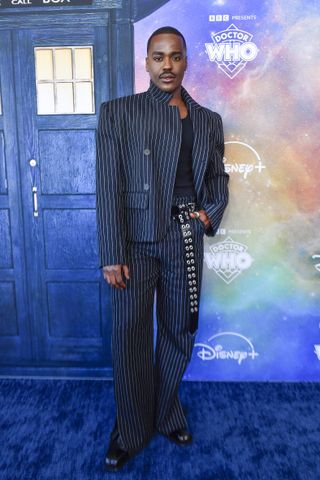
(Image credit: Getty Images)
When I ask him about his relationship with clothes and how they help him express himself, his eyes light up. In the 20 minutes we’ve spent together, I know Gatwa values three things: his relationships, his work and fashion. “I love fashion! Love, love, love fashion. It’s my other deep love. When I was growing up, I didn’t have access to any big brands or designers or anything like that, but it was always love. I would steal all my brothers’ and sisters’ outfits and try to make something for myself.” He laughs at the memory. “Oh man, I was such an experimental little teen. I definitely had a phase of wearing neon shoelaces up and down my arms. Loved. It. Growing up, [fashion] was like an armor to me. There were times I would use it to assimilate myself, and then there were times I’d use it to stand out and create such a loud version of myself so that people would stay away—I used it as an armor for lots of things. And it’s a different way of expressing yourself. Now, I have the means to dip into luxury fashion, but I still don’t think fashion or style equates to how much you spend or your bank balance. I think if you have good style, you have good style—there are people out there who can make a bin bag look good. It’s about trying to push out what’s inside to the outside. Now, it means something slightly different to me to what it did in my teens, but it’s still a form of self-expression that I love.”
If Gatwa could travel back in time and tell his younger, shoelace-wearing self anything, knowing what he knows now, on the precipice of what will likely be a career-defining role, I ask what would that be. “Just keep going, babes, just keep going,” he says without a whisper of hesitation. “Everything is fine in the end. Whatever you think is the end of your life, you know, exams or whatever, there will be a life without exams. The things you’re worried about will not always be there; there’s light at the end of the tunnel. Just keep going. Take the pressure off yourself, babes. Everyone everyone is a mess. Everyone is an absolute mess. And it’s so beautiful.”
Doctor Who is available to stream now on Disney+ and BBC iPlayer.
This post originally appeared on Who What Wear UK.
Source link
https%3A%2F%2Fwww.whowhatwear.com%2Ffashion%2Fcelebrity%2Fncuti-gatwa-doctor-who-style-interview
#Ncuti #Gatwa #Ready #Universe


